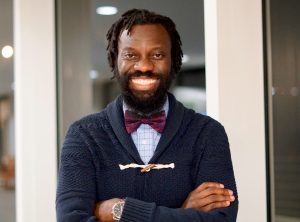Subscriber Benefit
As a subscriber you can listen to articles at work, in the car, or while you work out. Subscribe NowThere are things in life you can set your watch to; a national reckoning over race is not one of them, as I would come to find out in the spring of 2020. That May, I released a statement in my first official act as president of the Black Law Students Association. I harbored hope that my words might be of some utility for those struggling to grapple with the moment. The law school had yet to issue a public response to what became the largest movement for civil rights where the law would assuredly be implicated.

The statement preceded my introductory letter, customary for any incoming leader to their constituents, which should give you an indication of the significance of what was transpiring. The world had recently borne witness to then-17-year-old Darnella Frazier’s harrowing video recording of the murder of George Floyd. Before that, we learned about the killing of Breonna Taylor. And before that, there was Ahmaud Arbery.
As a Black man and law student, the moment was sobering. During a pandemic, while most of us were cultivating new ways to live, the spectacle of Black death abounded. Powerfully present was the toll that racism extracts from our toil, a strange guilt for choosing to be a part of a legal system that qualifies the devastation. If there was any solace to be found (and there was little) it was that I had not yet watched their final minutes.
To watch would have been to disturb the sense of safety I tell myself is not beyond imagination. But the collective grief we experienced in the wake — familiar in ways both seen and unseen — disrupted that notion. Then again, I didn’t need to watch; hate tends to be unimaginative in carrying out its handiwork, no matter the vessel it uses.
The aforementioned invites the earnest, if not innocent, question of what I wish I were learning about the law. The more prudent question is, what does the law need to know about me? After all, what could it possibly know about the son of an immigrant father who became a U.S. citizen, the grandson of a mill worker who risked everything in his migration north and the nephew of an American soldier who, despite its shortcomings, still believed in the idea of America as the promised land?
Some legal scholars and practitioners will take issue with that question, arguing in the most intellectually abstract way that the right to equal protection is the law of this land. And yet, there is nothing abstract about what Elizabeth Alexander describes as “Black bodies in pain for public consumption.” Indeed, the pain can be as visceral to the witness as it is to the victim, though the experience is distinct. One need not have a knee physically pressing down on their neck to feel the weight of racism; death need not come knocking to understand the heightened suspicion at what awaits one on the other side of the door; or be on the receiving end of a bullet to feel lifeless.
Still, this belief in the idea of America is one I also share, deeply aware that promises fulfilled remain the province of the willing: those whose interests lie beyond statements of aspiration. In law school, we are introduced to traditions, namely, the common law, Socratic method and pedagogies focused only on teaching to the bar. Often, these traditions fail to center the experiences of those who historically have not always derived benefit from their usage. To my last point, while I applaud evocations of justice as a principle during the call to the profession and commencement ceremonies, the difficulty is with its seldom examination in between.
And so, what else are we to do in these after times but cultivate our elsewhere? In “Begin Again,” Eddie Glaude writes that elsewhere is a “physical” or “metaphorical” place that offers you “a moment of rest, to catch your breath and ready yourself to enter the fray once again, not so much whole and healed, but battle-scarred and prepared for yet another round.” I should know; it has been a sustaining force over the years. This version of coping does not ask one to merely accept what is; instead, it serves to fortify your spirit for what is to come. And the test will come.
No, not the final exam that follows the end of every semester, though that is most certainly a part of the equation. What I am referring to here is a test of faith that will determine whether the law will work for everyone: the agrarian and the academic, the laborer and the lawyer, the refugee and me. Since I began this journey, one case after another has managed to test the limits of our civility and strength of democracy, as well as the integrity of our profession. As I enter my last semester, the contest to deliver an exacting answer to the questions posed endures.
In the final analysis, vindication is never certain, but some things, like Mr. Floyd’s murder, can never be unseen. That we’ve now dispensed with the endless interrogatories about whether racism exists frees us to take up the more urgent inquiry of what we as a profession plan to do about it. And because you can’t set your watch to a reckoning of this magnitude, we should make the most of the time we have.•
• Richard Okello is a law student at Indiana University Robert H. McKinney School of Law. Opinions expressed are those of the author.
Please enable JavaScript to view this content.
